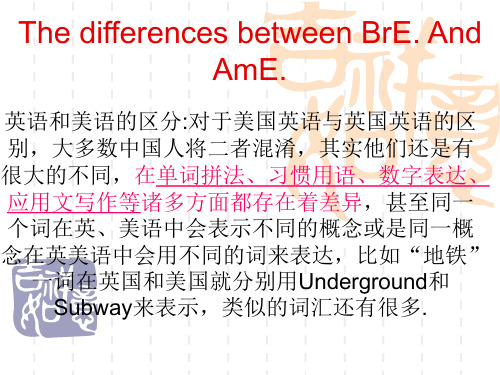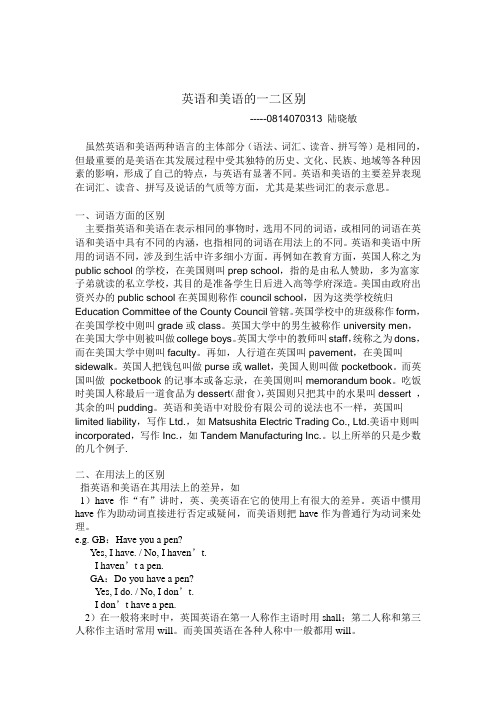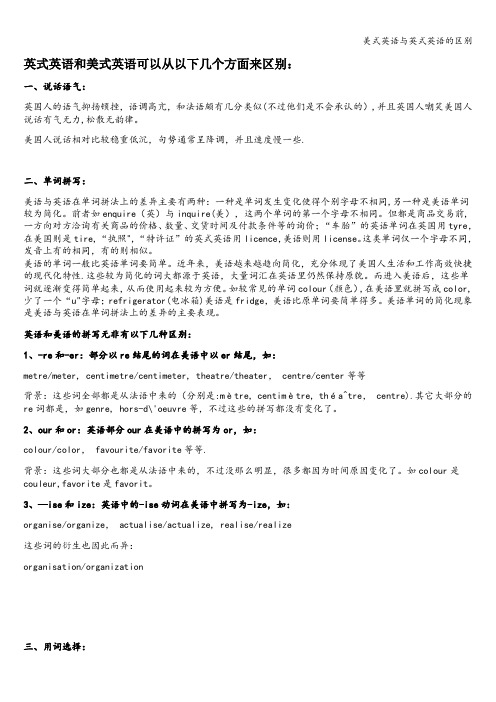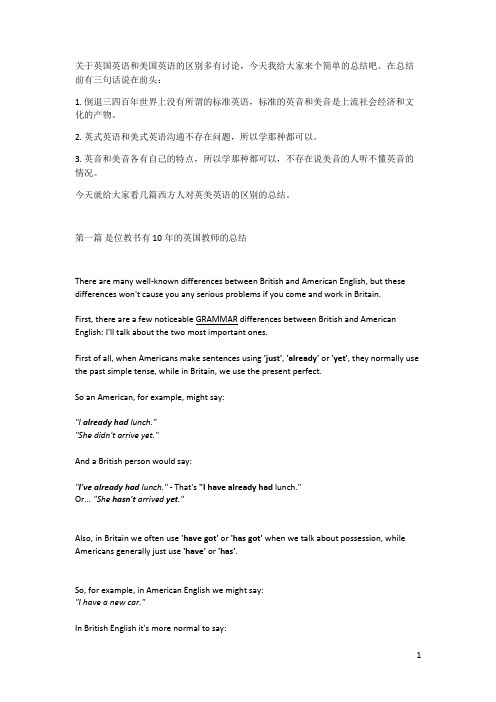个人总结最全英语与美语的区别
个人总结最全英语与美语的区别

英式英语与美式英语的区别一、拼写,美国人更注重实用性,因此美式英语的拼写比英式英语更简洁。
三、同一个意思,在英语和美语中分别用不同的词语(同义异词)四、发音上的区别五、语法及表达1. 名词1-2. 集合名词做主语时,英国英语的谓语动词可以是单数形式或者复数形式,美国英语几乎是用单数形式英式:They are a family who has been very influential in the history of this country.美式或英式:The committee has decided to look into the matter further.1-3. 名词作定语时,美国英语多用单数形式,而英国英语则常用其复数形式英式:The worker decided to form a new trades union.美式:The worker decided to form a new trade union.2. 动词英语中的to have 是个词性不明确的动词。
英国人既把它用作助动词又把它用作实义动词;美国人则一律将它当作实义动词来用。
当动词have有致使之意时,美国用have;英国对上级用get,对下级用make.英语中的to have 是个词性不明确的动词。
英式:I will get someone come.美式:I will have someone come.3. 形容词在美国英语中,形容词的比较级可以跟在all the 之后,表示强调。
而英国英语则使用any 加形容词比较级这一形式来表示强调英式:Can’t you do any better than that?美式:Is that all the better you can do?4. 时态表距现在不远的过去所发生或完成的事情,英国英语常用现在完成时,美国英语则倾向于使用一般过去时英式:I have studied your report already.美式:I studied your report already.英式:Now I know what it is! I’ve forgotten its name.美式:Now I know what it is! I forgot its name.5. 日期表达英式用日月年,美式用月日年,且日期里的st,nd,rd不写出来英式:20th March, 1998 读作the twentieth of March, nineteen ninety-eight美式:March 20, 1998 读作March the twentieth, nineteen ninety-eight6. 数字读法6-1. 数字读法,如175英式:a/one hundred and seventy-five美式:one hundred seventy-five, 常省略and6-2. 表述房间号,电话号时,英式多用double,triple,美式则直接读,三个连用时也用three +数字复数英式9224:nine double two four美式9224:nine two two four英式60009:six triple one nine美式60009:six one one one nine;six three ones nine。
英语与美语在语音和语调上的差异

英语与美语在语音和语调上的差异-CAL-FENGHAI.-(YICAI)-Company One1英语与美语同源并同属一家,但由于地理、文化、政治和经济等多方面的不同,历经400年,各自朝不同的方向发展,在词汇、语法和发音等方面两者已出现很多差异,这其中尤以语音和语调最为突出。
英语和美语的发音虽不像汉语那样自2001年起已有法定标准,但两者均有占据统治地位的相对标准,分别以BBC和VOA为代表,而这两个标准又分别被称为Received Pronunciation(英语公认标准)和 General American(美语普通话),在专业著述中常使用其缩写RP和GA。
由于英语的注音符号和发音与国际音标极为相近,所以国内90%以上的英语字典和教科书的注音都使用国际音标。
系统全面地研究学习英美语音和语调的区别对普通学习者而言可能并无必要,但不论是喜欢英语还是偏爱美语,学习者都应了解两者间的主要差异,使用时注意语音和语调的统一,避免在同一场合口音杂陈,贻笑听者。
举例来说,一个人如果一会儿讲普通话,一会儿出山东腔,不仅会使听者难以忍受,而且还会影响他个人以及所代表的公司的形象!讲英语也是同样的道理。
为方便学习者了解英语(RP)和美语(GA)之间的主要差异,现做如下比较:一.语音差异1. 元音差别:字母相同,发音不同例词 RP GAnot / nɔt / / nɑt /top / tɔp / / tɑp /ate /et/ /eit/either /aiðə/ /iðə/hurry /'hʌri/ /'hə:ri/worry /'wʌri/ /'wə:ri/ask /ɑ:sk/ /æsk/can’t /kɑ:nt/ /kænt/chance /tʃɑ:ns/ /tʃæns/class /klɑ:s/ /klæs/hero /'hiərəu/ /'hi:rəu/during /'djuəriŋ/ /'dju:riŋ/tomato /tə'mɑ:təu/ /tə'meitəu/epoch /'i:pɔk/ /'epək/mobile /'məubail/ /'məubil/missile /'misail/ /'misil/lever /'li:və/ /'levər/2. 辅音差别:RP清晰,GA含混例词 RP GAunderstand /,ʌndə'stænd/ /,ʌndə'stænd/ writer /'raitə/ /'raitər/3.重音差别:主次重音不同,多无规律例词 RP GAdonate /dəu'neit/ /'dəuneit/migrate /mai'ɡreit/ /'maiɡreit/commentary /'kɔməntri/ /'kɔmən,təri/ secretary /'sekrətri/ /'sekrə,təri/4. 字母r的差别例词 RP GAworker /'wə:kə/ /'wərkər/father /'fɑ:ðə/ /'fɑrðər/farm /fɑ:m/ /fɑ:rm/far /fɑ:/ / fɑ:r/beer /biə/ / bir/bear /beə/ /ber/poor /puə/ /pur/air /εə/ /εər/在GA中,只要字母r出现,不论在元音前还是元音后都发音,而且是明显的卷舌音。
英语和美语的区别1

1-3. 讲授和大学讲师 讲授:instruction(美);tuition(英)
Tuition这个词我们不陌生表示学费。但是,在英 国英语里tuition也是讲授的意思,上数学课可以 说to give tuition in mathematics. 在美国英语里,讲授是instruction,美国大学老师 就叫instructor(讲师),职称高于其的有assistant professor(助理教授),associate professor(副教 授)和professor(正教授)。在美国英语里,lecturer 不是中国概念的讲师,而是从校外请来讲课或开 讲座的人。Lecture表示“讲师”是英国英语。
(2) our和or:英语部分our在美语中的拼写为or, 如: colour/color, favourite/favorite等等。 背景:这些词大部分也都是从法语中来的,不过 没那么明显,很多都因为时间原因变化了。如 colour是couleur,favorite是favorit。
(3) -ise和ize:英语中的-ise动词在美语中拼写为ize,如: organise/organize, actualise/actualize, realise/re alize 这些词的衍生也因此而异: organisation/organization 背景:这些词还是从法语中来的,分别为 organiser, actualiser, réaliser(但因为语言的演 变,法文里这些词现在的意思和英文里这些词现 在的意思不完全一样了,如actualise现在的意思 是“实现”,而 actualiser是“升级,使不过时”; realise现在的意思是“意识到”,而réaliser就变 成了“实现”)。
(7)电梯"英语是lift,美语是elevator, (8)履历"、"简历"英语用C.V.(全称是 Curriculum Vitae),美语用resume;“ (9)电影"英语用film,美语用movie; (10)展销会"、"博览会"英语常用fair,美语常用 trade show; (11)有限责任公司"英语习惯上是在公司的名称 下加Ltd, L'd,或Ld., 美语则使用 Inc.(=Incorporated),如: The British Tobacco co., Ltd.(英国烟草股 份有限公司) The American Products co, Inc. (美国物产 股份有限公司)
英语美语区别

英语和美语的一二区别-----0814070313 陆晓敏虽然英语和美语两种语言的主体部分(语法、词汇、读音、拼写等)是相同的,但最重要的是美语在其发展过程中受其独特的历史、文化、民族、地域等各种因素的影响,形成了自己的特点,与英语有显著不同。
英语和美语的主要差异表现在词汇、读音、拼写及说话的气质等方面,尤其是某些词汇的表示意思。
一、词语方面的区别主要指英语和美语在表示相同的事物时,选用不同的词语,或相同的词语在英语和美语中具有不同的内涵,也指相同的词语在用法上的不同。
英语和美语中所用的词语不同,涉及到生活中许多细小方面。
再例如在教育方面,英国人称之为public school的学校,在美国则叫prep school,指的是由私人赞助,多为富家子弟就读的私立学校,其目的是准备学生日后进入高等学府深造。
美国由政府出资兴办的public school在英国则称作council school,因为这类学校统归Education Committee of the County Council管辖。
英国学校中的班级称作form,在美国学校中则叫grade或class。
英国大学中的男生被称作university men,在美国大学中则被叫做college boys。
英国大学中的教师叫staff,统称之为dons,而在美国大学中则叫faculty。
再如,人行道在英国叫pavement,在美国叫sidewalk。
英国人把钱包叫做purse或wallet,美国人则叫做pocketbook。
而英国叫做pocketbook的记事本或备忘录,在美国则叫memorandum book。
吃饭时美国人称最后一道食品为dessert(甜食),英国则只把其中的水果叫dessert ,其余的叫pudding。
英语和美语中对股份有限公司的说法也不一样,英国叫limited liability,写作Ltd.,如Matsushita Electric Trading Co., Ltd.美语中则叫incorporated,写作Inc.,如Tandem Manufacturing Inc.。
美语与英语的差异

“不得不”、“必须”做什么,英语用to have got to do something,美语只须说to have to do something; “假期临时工”英语用holiday jobs,美语用 summer/temporary jobs;
3、读音上的不同
例如:在ask, can‘t, dance, fast, half 这一类的单词中, 英国人将字母a 读作[a:],而美国人则读作[æ ],所以这 些词在美国人口中就成了 [æ sk] [kæ nt] [dæ ns] [fæ st] [hæ f] 。
英式英语
美式英语
中文
centre
colour realise organise
center
color realize organize
中心
பைடு நூலகம்
颜色
发现 组织
2、习惯上的差异
美语与英语在习惯用法上也存在着明显的差异。
英国英语在虚拟式中往往要加should,而美语大 都不用。
表示“有”或“没有”的概念,英语用to have/haven’t got,美语则用to have/don’t have;
1、拼写上的差异
2、习惯上的差异 3、读法上的差异
1、拼写上的差异
1)英国英语单词中不发音的词尾 -me, -ue在 美 国英语拼写中被删除。 programme/program ( 方案)等。 2) 英国英语中的以 -our 结尾的单词, 在美国 英语中删去了不发音的字母 u。如: behaviour/behavior( 举止、行为), discolour/discolor( 褪色)等。
英语读法
car [ka:] [‘pa:ti]
美语读法
美式英语与英式英语的区别

英式英语和美式英语可以从以下几个方面来区别:一、说话语气:英国人的语气抑扬顿挫,语调高亢,和法语颇有几分类似(不过他们是不会承认的),并且英国人嘲笑美国人说话有气无力,松散无韵律。
美国人说话相对比较稳重低沉,句势通常呈降调,并且速度慢一些.二、单词拼写:美语与英语在单词拼法上的差异主要有两种:一种是单词发生变化使得个别字母不相同,另一种是美语单词较为简化。
前者如enquire(英)与inquire(美),这两个单词的第一个字母不相同。
但都是商品交易前,一方向对方洽询有关商品的价格、数量、交货时间及付款条件等的询价;“车胎”的英语单词在英国用tyre,在美国则是tire,“执照",“特许证”的英式英语用licence,美语则用license。
这类单词仅一个字母不同,发音上有的相同,有的则相似。
美语的单词一般比英语单词要简单。
近年来,美语越来越趋向简化,充分体现了美国人生活和工作高效快捷的现代化特性.这些较为简化的词大都源于英语,大量词汇在英语里仍然保持原貌。
而进入美语后,这些单词就逐渐变得简单起来,从而使用起来较为方便。
如较常见的单词colour(颜色),在美语里就拼写成color,少了一个“u"字母;refrigerator(电冰箱)美语是fridge,美语比原单词要简单得多。
美语单词的简化现象是美语与英语在单词拼法上的差异的主要表现。
英语和美语的拼写无非有以下几种区别:1、-re和-er:部分以re结尾的词在美语中以er结尾,如:metre/meter, centimetre/centimeter, theatre/theater, centre/center等等背景:这些词全部都是从法语中来的(分别是:mètre, centimètre, théa^tre, centre).其它大部分的re词都是,如genre, hors-d\'oeuvre等,不过这些的拼写都没有变化了。
英国英语和美国英语区别大总结

关于英国英语和美国英语的区别多有讨论,今天我给大家来个简单的总结吧。
在总结前有三句话说在前头:1. 倒退三四百年世界上没有所谓的标准英语,标准的英音和美音是上流社会经济和文化的产物。
2. 英式英语和美式英语沟通不存在问题,所以学那种都可以。
3. 英音和美音各有自己的特点,所以学那种都可以,不存在说美音的人听不懂英音的情况。
今天就给大家看几篇西方人对英美英语的区别的总结。
第一篇是位教书有10年的英国教师的总结There are many well-known differences between British and American English, but these differences won't cause you any serious problems if you come and work in Britain.First, there are a few noticeable GRAMMAR differences between British and American English: I'll talk about the two most important ones.First of all, when Americans make sentences using 'just', 'already' or 'yet', they normally use the past simple tense, while in Britain, we use the present perfect.So an American, for example, might say:"I already had lunch.""She didn't arrive yet."And a British person would say:"I've already had lunch." - That's "I have already had lunch."Or... "She hasn't arrived yet."Also, in Britain we often use 'have got' or 'has got' when we talk about possession, while Americans generally just use 'have' or 'has'.So, for example, in American English we might say:"I have a new car."In British English it's more normal to say:"I've got a new car."The meaning's the same, there's just a small grammatical difference that you might notice.There are these and a few other very small differences, but to be honest, these differences almost never make it difficult for us to understand each other.On the other hand, the differences in VOCABULARY between American English and British English are stronger than the grammatical differences, but again, these very rarely cause serious problems.A lot of the words which are different are informal or slang words...For example, I think many Americans would be unfamiliar with the British slang word 'naff', which means 'un-cool' or 'poor-quality'.On the other hand, a Brit (a British person) might be very confused by a sentence like:"The café is kitty-corner to the pharmacy."This means that the café is diagonally opposite to the pharmacy, but we don't have the word'kitty-corner' in British English.Another example would be telling the time...If we want to describe 2:45 in Britain, we might say:"Quarter to three", or 3:15 would be "Quarter past three".On the other hand, in America, these might be:"Quarter of three" for 2:45, or "Quarter after three" for 3:15.It's another small difference, but it's one that's not going to cause serious problems - it's quite easy to get used to.There are also some differences in SPELLING which I should mention.One example of this is the verb 'to practise':In British English, this is spelt with an 'S', so that'sP-R-A-C-T-I-S-E.In American English, it's spelt with two 'C's, so in American English it'sP-R-A-C-T-I-C-E.And there are lots of other examples of slight difference of spelling, but about 99% of the time, British and American people can understand each other without any trouble at all. In Britain we watch lots of American films and TV programs, and we listen to lots of American music, so American English is generally very familiar to us.This is probably not quite so true for an American coming to Britain. Americans, I think, don't watch quite so much British TV or British movies.I should also point out that regional English can be an important thing to think about. Not everyone in Britain talks like James Bond. There are some regional accents in Britain which you don't hear so often in the movies, and these might be a bit more difficult to get used to.However, I'd like to finish by saying that many, many Americans live and work in Britain, and they don't have any serious language problems at all. So, Brittney, my advice to you is: don't worry about the language, you'll be fine!第二篇关于两种拼写牛津在线词典给了详细的说明British and American spellingThere are several areas in which British and American spelling are different. These are the main ones to be aware of.Words ending in –reBritish English words that end in -re often end in -er in American English:Words ending in -ourBritish English words ending in -our usually end in -or in American English:Words ending in -ize or -iseVerbs in British English that can be spelled with either -ize or -ise at the end are always spelled with -ize at the end in American English:Words ending in -yseVerbs in British English that end in -yse are always spelled -yze in American English:Words ending in a vowel plus lIn British spelling, verbs ending in a vowel plus l double the l when adding endings that begin with a vowel. In American English, the l is not doubled:Words spelled with double vowelsBritish English words that are spelled with the double vowels ae or oe are just spelled with an e in American English:Note that in American English, certain terms, such as archaeology, keep the ae spelling as standard, although the spelling with just the e (i.e. archeology) is usually acceptable as well.Nouns ending with –enceSome nouns that end with -ence in British English are spelled -ense in American English:Nouns ending with –ogueSome nouns that end with -ogue in British English end with either -og or -ogue in American English:The distinctions here are not hard and fast. The spelling analogue is acceptable but not very common in American English; catalog has become the US norm, but catalogue is not uncommon; dialogue is still preferred over dialog.Aside from spelling differences, many items and practices have different names in British and American English. To explore further, see British and American terms.第三篇这位老师给了更详细的一个说明IntroductionSpeakers of American English generally use the present perfect tense (have/has + past participle) far less than speakers of British English. In spoken American English it is very common to use the simple past tense as an alternative in situations where the present perfect would usually have been used in British English. The two situations where this is especially likely are:(i) In sentences which talk about an action in the past that has an effect in the present: American English / British English•Jenny feels ill. She ate too much.•Jenny feels ill. She's eaten too much.•I can't find my keys. Did you see them anywhere?•I can't find my keys. Have you seen them anywhere?(ii) In sentences which contain the words already, just or yet:American English / British English•A: Are they going to the show tonight?•B: No. They already saw it.•A: Are they going to the show tonight?•B: No. They've already seen it.•A: Is Samantha here?•B: No, she just left.•A: Is Samantha here?•B: No, she's just left.•A: Can I borrow your book?•B: No, I didn't read it yet.•A: Can I borrow your book?•B: No, I haven't read it yet.1. Verb agreement with collective nounsIn British English collective nouns, (i.e. nouns referring to particular groups of people or things), (e.g. staff , government, class, team) can be followed by a singular or plural verb depending on whether the group is thought of as one idea, or as many individuals, e.g.:My team is winning.The other team are all sitting down.In American English collective nouns are always followed by a singular verb, so an American would usually say:Which team is losing?whereas in British English both plural and singular forms of the verb are possible, as in:Which team is/are losing?2. Use of delexical verbs have and takeIn British English, the verb have frequently functions as what is technically referred to as a delexical verb, i.e. it is used in contexts where it has very little meaning in itself but occurs with an object noun which describes an action, e.g.:I'd like to have a bath.Have is frequently used in this way with nouns referring to common activities such as washing or resting, e.g.:She's having a little nap.I'll just have a quick shower before we go out.In American English, the verb take, rather than have, is used in these contexts, e.g.:Joe's taking a shower.I'd like to take a bath.Let's take a short vacation.Why don't you take a rest now?3. Use of auxiliaries and modalsIn British English, the auxiliary do is often used as a substitute for a verb when replying to a question, e.g.:•A: Are you coming with us?•B: I might do.In American English, do is not used in this way, e.g.:•A: Are you coming with us?•B: I might.In British English needn't is often used instead of don't need to, e.g.:They needn't come to school today.They don't need to come to school today.In American English needn't is very unusual and the usual form is don't need to, i.e.:They don't need to come to school today.In British English, shall is sometimes used as an alternative to will to talk about the future, e.g.:I shall/will be there later.In American English, shall is unusual and will is normally used.In British English shall I / we is often used to ask for advice or an opinion, e.g.:Shall we ask him to come with us?In American English should is often used instead of shall, i.e.:Should we ask him to come with us?4. Use of prepositionsIn British English, at is used with many time expressions, e.g.:at Christmas/five 'o' clockat the weekendIn American English, on is always used when talking about the weekend, not at, e.g.:Will they still be there on the weekend?She'll be coming home on weekends.In British English, at is often used when talking about universities or other institutions, e.g.: She studied chemistry at university.In American English, in is often used, e.g.:She studied French in high school.In British English, to and from are used with the adjective different, e.g.:This place is different from/to anything I've seen before.In American English from and than are used with different, e.g.:This place is different from/than anything I've seen before.In British English to is always used after the verb write, e.g.:I promised to write to her every day.In American English, to can be omitted after write, i.e.:I promised to write her every day.5. Past tense formsBelow is a table showing verbs which have different simple past and past participle forms in American and British English. Note that the irregular past forms burnt, dreamt and spoilt are possible in American English, but less common than the forms ending in -ed.Infinitive Simple past(Br) Simple past(Am)Past participle(Br)Past participle(Am)burn burned/ burned/ burned/ burned/(Br) (Am) (Br) (Am)burnt burnt burnt burnt bust bust busted bust busteddive dived dove/diveddived diveddream dreamed/dreamt dreamed/dreamtdreamed/dreamtdreamed/dreamtget got got got gottenlean leaned/leant leaned leaned/leantleanedlearn learned/learnt learned learned/learntlearnedplead pleaded pleaded/pled pleaded pleaded/pledprove proved proved proved proved/provensaw sawed sawed sawn sawn/sawedsmell smelled/smelt smelled smelled/smeltsmelledspill spilled/spilt spilled spilled/spiltspilled(Br) (Am) (Br) (Am)spoil spoiled/spoilt spoiled/spoiltspoiled/spoiltspoiled/spoiltstink stank stank/stunkstunk stunkwake woke woke/wakedwoken wokenNote that have got is possible in American English, but is used with themeaning 'have', gotten is the usual past participle of get, e.g.American English British EnglishYou've got two brothers(= you have two brothers)You've got two brothersYou've gotten taller this year You've got taller this year6. Implications for teachingThe two major varieties of EnglishThe two varieties of English most widely found in print and taught around the world are British and American - it is therefore important for teachers to be aware of the major differences between the two. And while lexical differences are the easiest ones to notice, a knowledge of grammatical and phonological differences can be useful not only for teachers to be aware of, but also to be able to deal with should they come up in class.Which is better?An important point to make is that different doesn’t mean wrong. Comments such as “American English is inferior to British English”, or “American English is better than British English” have no solid basis other than the speaker’s opinion. The truth is that no language or regional variety of language is inherently better or worse than another. They are just different. Students will often have very firm beliefs on which English they think isbetter/easier to understand/clearer etc. While it may be true for that particular individual,there is no evidence to suggest that one variety is easier to learn or understand than the other.Materials and varietiesIf you are an American English speaker teaching with a British coursebook or vice versa, what do you say when the book is different from your English? The answer here is to point out the difference. The differences are not so numerous as to overload the students and often can be easily dealt with. For example, if you are an American English speaker using a lesson that has just included “at the weekend” it takes very little time to point out that in American English people say “on the weekend”. Accept either from your students then. If you decide to go along with the book and say “at the weekend” yourself, you’ll probably sound unnatural, and “on the weekend” might slip out anyway!Exams and essay writingIn most international exams, both varieties of English are accepted. However, while writing for an international exam (or writing in English generally) students should try to remain consistent. That means if they favour (or favor) American spelling and grammar, they should stick to that convention for the whole piece of writing.What role do other varieties of English have in the classroom?Although British and American varieties are the most documented, there are of course many other varieties of English. Scotland, Ireland, South Asia, Canada, Australia, New Zealand, West Africa, the Caribbean, South Africa all have their own regional variations of English. The decision whether or not to highlight aspects of these Englishes would depend on two factors:if the students are going to live, or are already living, in one of these places - in which case the need to understand specific aspects of that English is clear; orif the teacher is from one of those places and therefore speaks a regional variation of English. In this case it could be useful to occasionally point out differences between your English and that of your Anchor Point:bottomcoursebook (see point 3 above about using your own variety).。
(完整版)英音美音七大区别(终极版)

Part 2 字母的读音元音辅音Aa/eɪ/ Bb/biː/ Cc/siː/ Dd/diː/Ee/iː/ Ff/ef/ Gg/ʤiː/ Hh/eɪʧ/Ii/aɪ/ Jj/ʤeɪ/ Kk/keɪ/ Ll/el/ Mm/em/ Nn/en/ Oo/əʊ/ Pp/piː/ Qq/kjuː/ Rr/ɑː/ Ss/es/ Tt/tiː/ Uu/juː/ Vv/viː/ Ww/ˈdʌbljuː/Xx/eks/ Yy/waɪ/ Zz/zed/前言:大家好欢迎大家在晚间8点20分来到8600海词频道发音班的课堂来听课,我是你们的老朋友chris小雅。
在昨天呢我们已经上完了所有的发音课,不过大家不要担心,今天呢我和大家一起来总结发音中英音跟美音的7大区别。
我们先来看一个关于发音的小笑话一位英国人和美国人在火车站不期而遇。
美国人性格开朗,善于结交朋友,说了几句客套话后就问:“What’s your job?”。
英国人回答说“I’m a clerk. ”美国人听了十分惊讶:“C lock? Your job is to tick tick all day long? ”clerk英音:[klɑ:k]美音:[klɝk]办事员,职员;书记;记帐员clock英音:[klɔk]美音:[klɑk]时钟美式英语的起源美国英语是英国英语的一种区域语言变体,它起源于17~18世纪的英国英语。英国在北美地区曾先后建立了13个殖民地,同时英国殖民者也把莎士比亚(Shakespeare)和弥尔顿(Milton)的英语带到了美洲。
诺亚•韦伯斯特(Noah Webster),首创“American English ”1828年,出版《美语词典》(American Dictionary of english Language )从而开启了韦氏词典的历史,进而开启了美式英语的历史。
RP(我人品很好==)与GA 的含义英语和美语的发音虽不像汉语那样自2001年起已有法定标准,但两者均有占据统治地位的相对标准,分别以BBC和VOA为代表,而这两个标准又分别被称为Received Pronunciation(英语公认标准)和General American(美语普通话),在专业著述中常使用其缩写RP和G A。
- 1、下载文档前请自行甄别文档内容的完整性,平台不提供额外的编辑、内容补充、找答案等附加服务。
- 2、"仅部分预览"的文档,不可在线预览部分如存在完整性等问题,可反馈申请退款(可完整预览的文档不适用该条件!)。
- 3、如文档侵犯您的权益,请联系客服反馈,我们会尽快为您处理(人工客服工作时间:9:00-18:30)。
英式英语与美式英语的区别
一、拼写,美国人更注重实用性,因此美式英语的拼写比英式英语更简洁。
二、同一个词在英语和美语中可能指不一样的东西(同词异义)
三、同一个意思,在英语和美语中分别用不同的词语(同义异词)
四、发音上的区别
五、语法及表达
1. 名词
1-2. 集合名词做主语时,英国英语的谓语动词可以是单数形式或者复数形式,美国英语几乎是用单数形式英式:They are a family who has been very influential in the history of this country.
美式或英式:The committee has decided to look into the matter further.
1-3. 名词作定语时,美国英语多用单数形式,而英国英语则常用其复数形式
英式:The worker decided to form a new trades union.
美式:The worker decided to form a new trade union.
2. 动词
英语中的to have 是个词性不明确的动词。
英国人既把它用作助动词又把它用作实义动词;美国人则一律将它当作实义动词来用。
当动词have有致使之意时,美国用have;英国对上级用get,对下级用make.英语中的to have 是个词性不明确的动词。
英式:I will get someone come.
美式:I will have someone come.
3. 形容词
在美国英语中,形容词的比较级可以跟在all the 之后,表示强调。
而英国英语则使用any 加形容词比较级这一形式来表示强调
英式:Can’t you do any better than that?
美式:Is that all the better you can do?
4. 时态
表距现在不远的过去所发生或完成的事情,英国英语常用现在完成时,美国英语则倾向于使用一般过去时英式:I have studied your report already.
美式:I studied your report already.
英式:Now I know what it is! I’ve forgotten its name.
美式:Now I know what it is! I forgot its name.
5. 日期表达
英式用日月年,美式用月日年,且日期里的st,nd,rd不写出来
英式:20th March, 1998 读作the twentieth of March, nineteen ninety-eight
美式:March 20, 1998 读作March the twentieth, nineteen ninety-eight
6. 数字读法
6-1. 数字读法,如175
英式:a/one hundred and seventy-five
美式:one hundred seventy-five, 常省略and
6-2. 表述房间号,电话号时,英式多用double,triple,美式则直接读,三个连用时也用three +数字复数英式9224:nine double two four
美式9224:nine two two four
英式60009:six triple one nine
美式60009:six one one one nine;six three ones nine。
